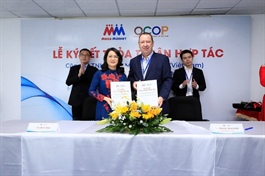New circular aims to abolish ambiguity in labelling
New circular aims to abolish ambiguity in labelling
The Ministry of Industry and Trade (MoIT) has submitted a draft circular on 'Vietnamese products and goods' and 'products and goods made in Viet Nam'.

Under the circular, there would be no “Made in Vietnam” marks on Vietnamese goods circulating in the domestic market.
Many businesses are deceiving consumers by importing components for assembly in Viet Nam and then affixing labels like “Vietnamese goods”, “Made in Vietnam”, or “high-quality Vietnamese goods”.
Many businesses have labelled low-quality goods as Vietnamese products to deceive consumers to take advantage of the fact that Vietnamese people are using Vietnamese goods more and more.
The ministry said Viet Nam has issued many regulations on the origin of goods, including how a product is considered to have Vietnamese origin. However, the regulations have only been applied for export and import goods, helping them enjoy import tax incentives in free trade agreements or for other purposes of foreign trade management. For domestically-produced goods, including those produced from imported materials and then circulated domestically, there is currently no regulation on labels like “Product of Vietnam” or “Made in Vietnam”.
The lack of regulations on how to define “products of Vietnam” or “Made in Vietnam” has caused confusion for many organisations and individuals when they want to accurately state the country of origin on labels of products and goods circulated domestically.
Some products, even though they are only simply processed and assembled in Viet Nam, are also labelled “Made in Vietnam”, making consumers frustrated. However, management agencies have no legal foundation for arbitration.
Therefore, the MoIT intends to stipulate that those to be expressed as products and goods of Viet Nam include goods of purely Vietnamese origin, goods made in Viet Nam from all raw materials originating in Viet Nam and goods not produced in Viet Nam from all raw materials of Vietnamese origin but undergoing final processing in the country which fundamentally changes the nature of goods.
For goods with simple processing, they will be considered not of Vietnamese origin.
The new circular will also remove the phrase “Made in Vietnam” which depending on the production and processing process, organisations and individuals could choose and use only one of the following labels “Produced in Vietnam”, “Manufacturing in Vietnam”, “Country of origin: Vietnam”; “Produced by: Vietnam”.
The ministry hopes that the circular will establish a mechanism to prevent trade fraud, protect domestic production and the interests of consumers.



























